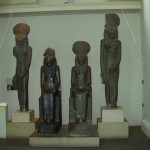Last week I saw two blog posts from respected polytheists lamenting – or at least, questioning – the compromises those of us on the outer edges of our religious movement must make in the name of peace and unity.
On Polytheist.com, P. Sufenas Virius Lupus wrote about the compromises polytheists make to participate in events like Pantheacon (which Lupus has attended every year since 2007).
Sometimes, though, these calls for unity of purpose and support of causes serve to be a substitute hegemony that seeks to erase diversity, silence dissent, and to disguise the plurality of our profound and important differences on the ground and in our daily functioning.
It is often under these kinds of auspice that we are encouraged to attend events like Pagan Pride Days, or large Pagan conventions like PantheaCon. We are told that we, as polytheists, are included under this “large tent” and the greater “umbrella” of modern Paganism, whether we want to be or not (and, certainly, some of us do want to be, while others do not), but do we do so at a cost that sacrifices our individuality, or elides our differences, all in the interests of peace?
On Under the Owl’s Wing, Hellenist and fellow Denton CUUPS member Conor Davis wrote an emotional account of not feeling at home in the UU church, with its emphasis on Christian myths and Humanist sensibilities.
“I” my voice cracked “don’t feel like I belong anywhere”. He let out a sympathetic “awww” and held me closer. “Why?” he replied, gentleness tinting his voice.
“Every time I think that maybe, just maybe I’ve found somewhere to call home … I get reminded that I don’t really belong. I’m just” my words caught in my throat and came out as a whisper “a visitor”.
I understand their concerns.
While I’ve had generally good experiences in the UU church, I’m well aware not many UUs share my Paganism, much less my polytheism. An old joke says “Unitarianism is the belief in one god, at most.” We have CUUPS (the Covenant of Unitarian Universalist Pagans) and it’s been a great thing for me, but even in my own chapter we have occasional rituals that could best be described as generic non-Gardnerian Wicca.
I’m a full member of the Druid grade in the Order of Bards, Ovates and Druids. I’ve attended six OBOD camps and I’ve taught or led ritual at all of them. But when OBOD Chosen Chief Philip Carr-Gomm was asked if Druidry is a religion, he answered “it’s all up to you.” OBOD teaches a set of spiritual practices and techniques that can be used in any religion. That flexibility is one of the main reasons OBOD is the largest Druid order in the world. But it also means that when we presented a devotional ritual to Cernunnos there were some who didn’t understand it, and a few who felt it was inappropriate.
My beliefs and practices are probably most closely aligned with ADF Druidry. While I’m not a member of ADF, I’ve borrowed extensively from their liturgies, and ADF founder Isaac Bonewits had more influence on my growth as a Pagan than any other person. Yet while I enjoy my time with the ADF Druids, I wouldn’t want to be limited to their liturgy for every ritual. I want to do the occasional Egyptian Temple Ritual and other activities that don’t really fit with what they do.
I could try to build my own religious tradition, but sooner or later I’d run into the same problems… or I’d cause them for someone else when I added this or subtracted that and someone complained “hey, this isn’t what I signed up for!”
The modern Western cult of the individual makes building homogeneous communities difficult. It makes building large homogeneous communities virtually impossible. In tribal cultures the desires of the individual are sublimated to the traditions of the tribe. Your primary identity isn’t the Self, it’s the Tribe. You do what your people have always done, because that’s who you are, what you are, and whose you are – doing your own thing is unthinkable. That’s never going to fly in modern Paganism, and anyone who suggests it will quickly be accused of trying to make themselves the “Pagan Pope” even if they have no interest in being in charge of anything.
But humans are social animals – we need each other. We need each other so much it’s worth forming and supporting imperfect, heterogeneous communities of convenience. We may not agree on theology, but we can work together to make the world a better place. We may not agree on how to honor the Gods, but we can come together to honor Them, or at least to embody and manifest Their virtues. We may never achieve “perfect love and perfect trust” but we can demonstrate some pretty good love and we can build some very workable trust.
None of my spiritual homes – and they are my homes – fill all my needs. But they all fill some of my needs and I support their goals, so I participate in their activities and I contribute my time and money to their support.
And for those occasions where I need a very homogeneous group to honor and serve a particular deity, or to contribute to a very specific magical working, or to do some specific thing to honor and care for Nature, I can send out very limited invitations to a very limited project.
Or I can just do it myself.
There are limits to communities of convenience. At some point, you simply don’t have enough in common with a group to make participation in their activities a meaningful thing for you. And sometimes there’s one big thing that drives you away – no matter how much they love Jesus, there’s no place for gay people in the Southern Baptist Convention.
How much difference can you accept? No one should have to live with abuse to have a family. No one should have to be marginalized to find a community. But I don’t have to have my every belief and practice constantly affirmed in order to participate in a group.
What can you live with?
The bottom line on communities of convenience is that they’ve brought me many, many good friends… just as I still have many good friends from my days as a Christian. We don’t see eye to eye on religious matters, but we still have other common interests and we still enjoy each other’s company.
I’d love to be part of a grove of polytheist Druids who draw from many sources, honor a variety of Gods, value good scholarship (but aren’t obsessed with it), love and revere Nature, and work to make the world a better place. Perhaps such a grove exists, somewhere. Perhaps I’ll be able to gather one, someday.
Until then, I’ll continue supporting and enjoying my communities of convenience.

















